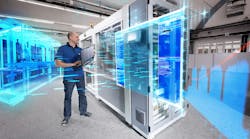Siemens USA CEO Humpton: Digital Transformation for Small Businesses and Space Exploration
Barbara Humpton, CEO of Siemens USA, sets her personal brand in positivity (she even hosts a webcast entitled The Optimistic Outlook) and using technology to expand human potential. This week, she'll deliver on Wednesday morning the final keynote address at the Automate 2023 conference taking place in Detroit, on the topic of digitalization and its impact on manufacturing.
Humpton sat down for an interview with IndustryWeek to share her thoughts on digitalization's potential benefits, the markets best suited to employ the technology and how small businesses may successfully adopt it.
IndustryWeek: Is there a deployment of digitalization technology that you reflect on, when you think about the good this technology can accomplish?
Barbara Humpton: Let’s think back about the way digitalization has transformed our private lives. The way we communicate with each other, the way we entertain each other, the way we shop, etc. That’s the Internet of people. What we’re doing now is taking those same tools and turning them toward the Internet of Things, or in Siemens’ case, the Internet of Really Big Things. Trains, buildings, electric grids, factories. What we see in real life are examples where digital tools have enabled something that literally wasn’t possible before. Classic example is, how do you land a rover on the surface of Mars?
IndustryWeek: Very carefully.
Barbara Humpton: Yeah, exactly. You get one shot. And there’s no way to reproduce the physical properties of Mars on Earth. So what do you do? You use computer simulation. NASA and Jet Propulsion Laboratories used Siemens software to model the rover, model the atmosphere and the conditions on Mars, and then to run thousands of simulations to find the right set of parameters that would lead to a successful landing. And the rest is history, right? It happened.
Think about being able to use those same tools to answer a different question where we might say, wow, this is overwhelming. It’s inscrutable. We have no idea what to do next. What about climate change? What about designing our next products to be more sustainable? How could we apply these digital tools to the way factories actually operate?... All of those are now within reach.
IndustryWeek: Is there a market segment where you see more excitement for digitization/digitalization than in others?
Barbara Humpton: We see this in battery production. The top 22 auto manufacturers are using our technology in order to bring their EVs to market, so all along that chain, all the way to the EV charging, where we ourselves are producers of the EV charging solutions, all of that is clamoring for this kind of automation.
The future of pharmaceuticals is going to include the concept of individualized medicine. The technology we’re bringing enables lot size one. The drug manufacturers who have brought us through the pandemic are now able to expand what they’ve learned with mRNA into other offerings, including cancer treatments. We believe we have a huge contribution to make in making all of that more efficient, more accessible, bringing these to market as quickly as possible to serve the huge demand.
We look at things like consumer packaged goods, a lot of people are realizing that they make stuff in all the wrong places. What they’d love to do is minimize their logistics strain. This is the same thing for, say, vertical farming, to bring agriculture closer to the point of demand. The ability to do that is really driven by the access to technologies that allow you to control environments, the ability to couple a design for an object with its process of execution, a bill of process that would enable you to make something.
IndustryWeek: Do you think a manufacturing company has to be large to meaningfully benefit from digitalization?
Barbara Humpton: In the future, we see tremendous opportunity for small and medium enterprises specifically enabled by the technologies we have today, but they have to be packaged in a different way…
We’ve been serving the large industrials, the large industrial enterprises. That’s been the bulk of the work that we do around the world. Then recognizing that the shift to software as a service, maybe everything as a service, maybe packaging hardware and software together, offering it through Xcelerator, our open digital business platform, making it possible for small and medium enterprises to find and then implement through their operating expense, not a large capital expense, implement the modern tools of manufacturing for their own operations. Minimal engineering overhead needed.
The challenge we’ve put before the team is, think about a transformation of something like the accounting sector. There are massive solutions to the back office that only the largest of manufacturers can afford. But there are some lightweight solutions that people use.… The goal is to package our technology in a way that it’s accessible and affordable to small and medium enterprises.
Then there’s one other thing. What can we do in the user interface itself, so that we package up our know-how, the engineering that requires the PhDs and the Master’s degrees, packaged into the software itself but with a user interface that feels a little more like a video game? More intuitive? That’s one of the goals we have, to make our capabilities more accessible, and then therefore more approachable.
IndustryWeek: What do you think is the most important first step for small manufacturers to embrace digital technology?
Barbara Humpton: With a digital transformation you can start small and then scale. We’ve done this on our own operations.
What I encourage people to do is build a multigenerational team. Bring digital natives into your workplace. Get them equipped with rugged iPads and just turn them loose to go start talking to the veterans in the organization about ‘What do you want to transform? What’s a problem you need to solve? And how can I go find the tools to do it?’
We’ve got a lot of Siemens equipment aboard Navy ships [to support and maintain military vessels]. We had a site in Norfolk where the people had followed the practices of generations, very much a paper-based, hands-on, totally driven by sheer sweat equity. We put a digital native in one summer, just an intern, and they said, ‘What in the world are we going to do with her?’ At the end of the summer they said, ‘Can we offer her a job?’ And Kelly has been a part of that operation ever since. You can start small and scale.
IndustryWeek: Is there a particular tool a manufacturer can embrace to help make that connection?
Barbara Humpton: The less prescriptive we are, the faster things move. … Empowerment is the superpower. The folks who are on the floor are the experts. Being told that they’re going to make a change often comes across as ‘This is something management has decided and not for us.’
Instead, what if the approach is ‘I want to give you resources, but it’s up to you where you take this?’
I’ve seen teams literally raise their hand and say ‘We’ve got to bring additive into the work we’re doing here. What we want is a couple of geeks to come join us..’
I’ve seen other areas where, like the folks in Norfolk, it was about getting their work instructions online so they were available to them wherever they went and it wasn’t back-breaking work just carrying the specs around. Letting our teams decide where they want to go next is the most powerful thing we can do.
About the Author
Dennis Scimeca
Dennis Scimeca is a veteran technology journalist with particular experience in vision system technology, machine learning/artificial intelligence, and augmented/mixed/virtual reality (XR), with bylines in consumer, developer, and B2B outlets.
At IndustryWeek, he covers the competitive advantages gained by manufacturers that deploy proven technologies. If you would like to share your story with IndustryWeek, please contact Dennis at [email protected].


